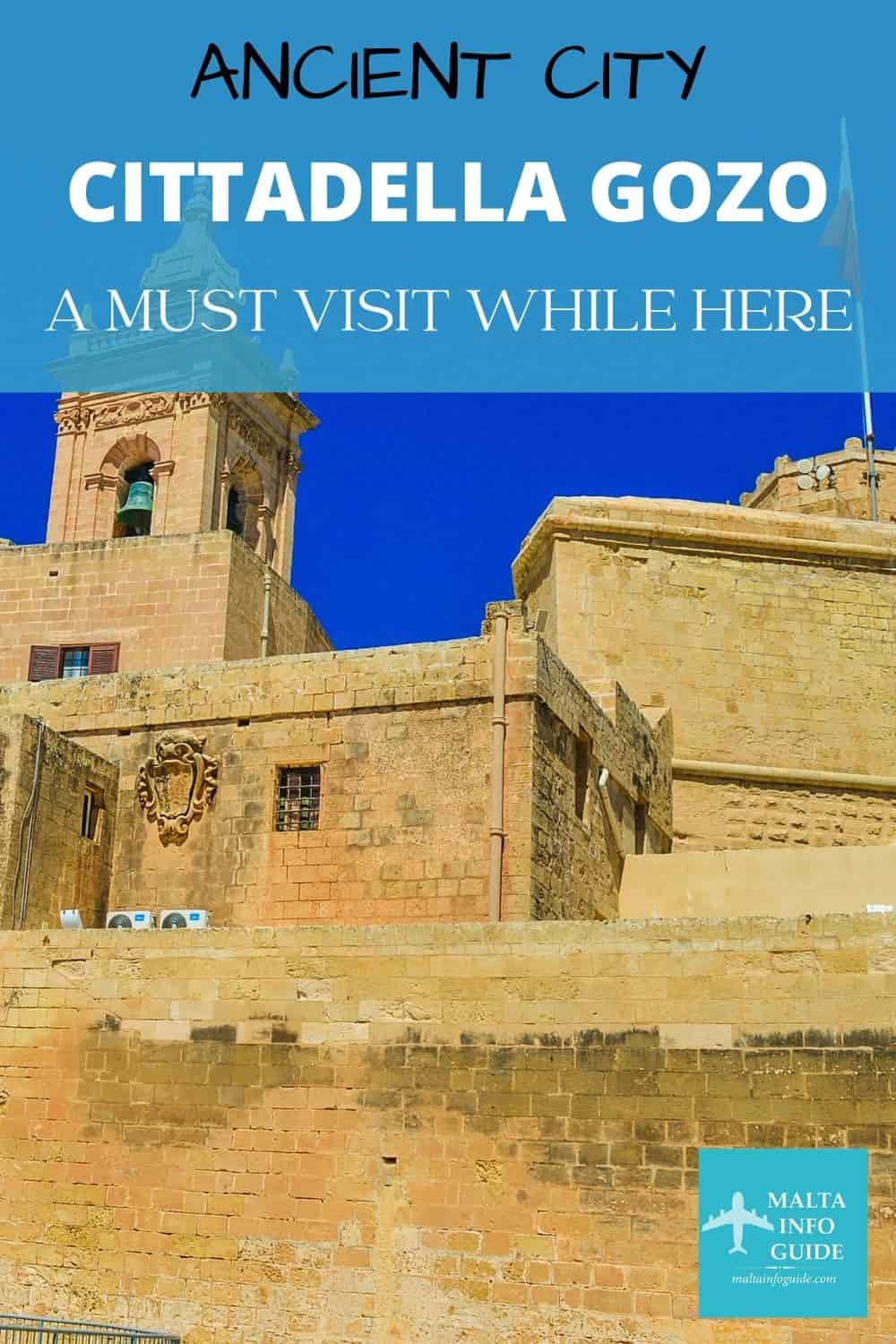- Home
- Gozo Island
- Citadel Gozo Malta
citadel gozo malta
What Makes It So Attractive To Visit
The Citadel Gozo Malta is the old capital city of the island of Gozo. It lies adjacent to Rabat and is just five minutes uphill from the central square. It is definitely worth a visit where one can appreciate the architectural beauty of the fortifications, the cathedral and other attractions in this small fortified old city.
7 Epic Things To Do In Malta In 1 Day
Watch the video below to discover the ultimate 24-hour adventure in Malta! (Sound ON 🔊) 7 Must-do Activities in 7 Minutes! Subscribe to our YouTube channel for more content like this.
The views from the top of the fortification walls are tremendous as one can view the whole island splayed out beneath with the Mediterranean sea beyond. The citadel is considered one of the top things to do on the island of Gozo.
It is a lovely place to visit during spring time where one can take in the beautiful scenery of all the hills and valleys lush with vegetation and the valleys ablaze with wild flowers. Even in autumn the sun shines in Gozo!
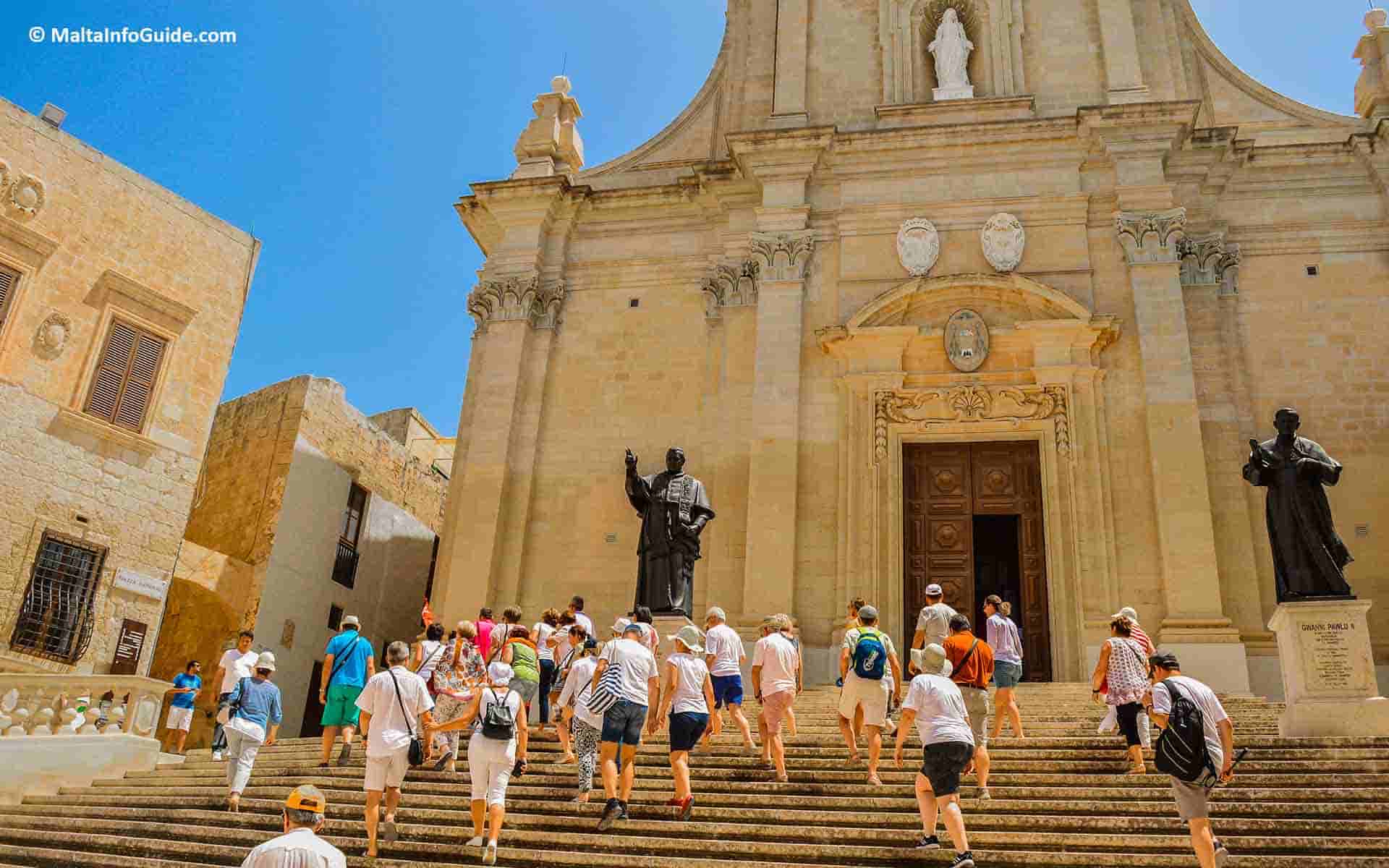 Citadel Gozo Malta | The Cathedral of the Assumption
Citadel Gozo Malta | The Cathedral of the AssumptionWhat To See At The Citadel
Cittadella Visitors’ Centre
This is the starting point of your tour of the Citadella. Located outside the fortifications coming up the hill, the visitors centre housed in two old water reservoirs built in the 1870’s offers you an incredible perspective with a great free introductory.
The opportunity to interact with touch screens and printed panels about the evolvement of the history through time. The second part is the audio-visual surround theatre where you can watch an eight-minute video about the main aspects of its history.
To arrive you take the elevator leading you to the entrance through the fortification or you keep on walking further up the staircase.
details about Cittadella Visitors’ Centre
- Opening Hours: Monday to Sunday between 09:00 to 17:00 and closed on 24, 25 and 31st December and 1st January.
- Purchase an all inclusive ticket to four sites within the visitor's centre, Natural History Museum, Old Prison, Museum of Archaeology and Gran Castello Historic House. Click here to buy online.
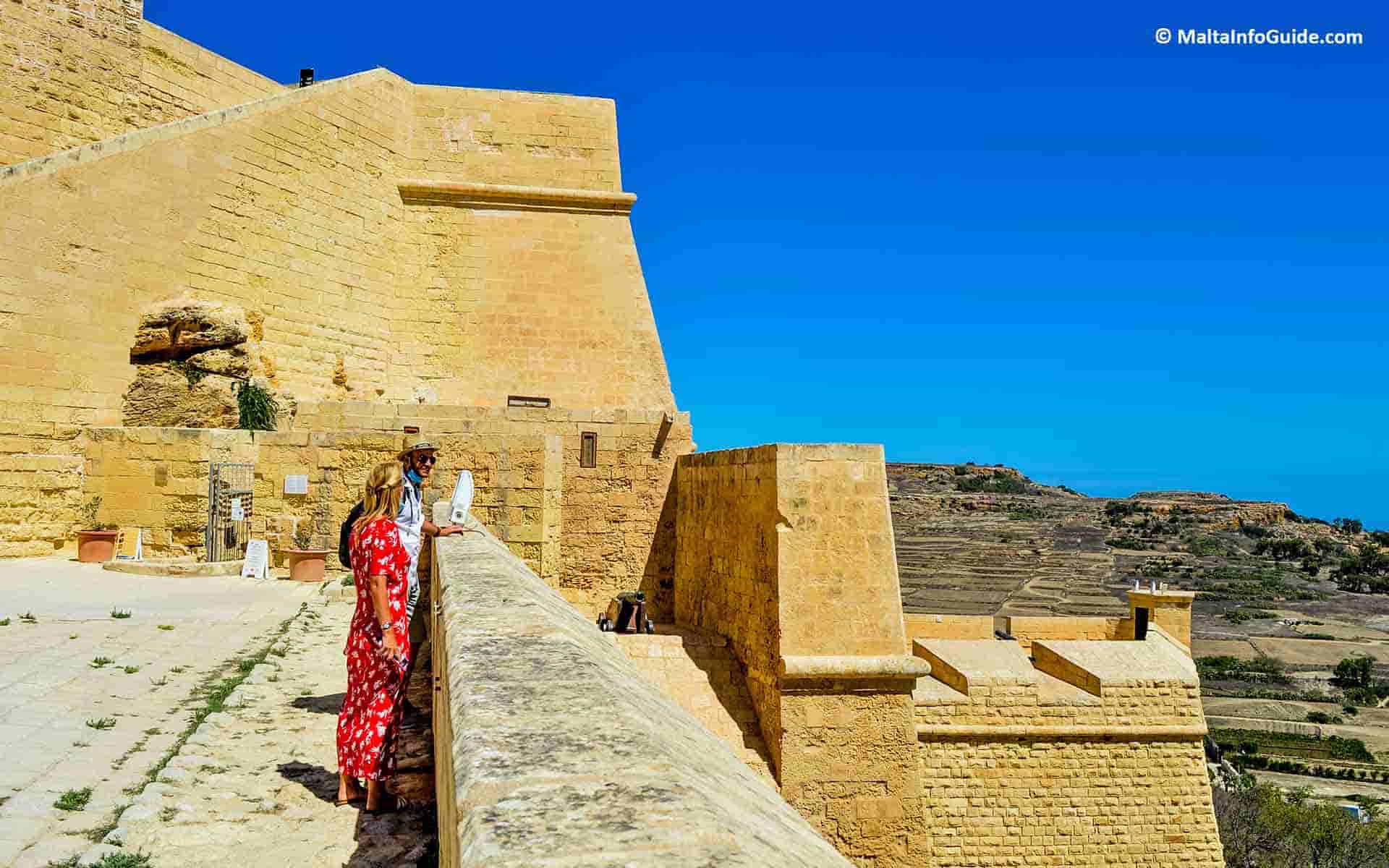 A fascinating walk around the fortifications at such an altitude that one may enjoy breath-taking views of Gozo and neighbouring Malta
A fascinating walk around the fortifications at such an altitude that one may enjoy breath-taking views of Gozo and neighbouring MaltaThe Cathedral of the Assumption
The Cathedral was built between 1697 and 1711 by the Maltese architect and sculptor Lorenzo Gafa who also designed the Mdina cathedral. It is a Roman Catholic church dedicated to the Assumption of Mary into Heaven. It is the seat of the Roman Catholic Diocese of Gozo since its formation in 1864.
It stands on what remains a Roman temple to the goddess Juno. It is said that there was two pagan temples and this area was also occupied by at least three churches. During the early 2000 a wall was discovered underneath the sacristy which is of Roman origin. Twelve visible courses were observed and all stones were in their original position.
Due to lack of funds the dome was not built so today it is still a flat roof. From inside it is the beauty that impresses everyone, it is painted with a false dome painted in trompe l'oeil by the Sicilian master Antonio Manuele from Messina in 1739. Trompe-l'œil is an art technique that succeeds to create an optical illusion that the object is in three dimensions.
The floor is covered with coloured designs of marble tombstones where there is numerous bishops and priests. Since 1998, the citadel has been included as one of Malta's tentative UNESCO World Heritage Sites.
details about the cathedral
- Cathedral is open to the public.
- You can view the cathedral by using the same ticket as entering the other sites at the Citadel.
- People wishing to enter for worship does not pay.
The Cathedral Museum
Just round the corner at the side of the cathedral within part of the cathedral’s building. It exhibits more than two thousand items with archives of the cathedral, paintings, clerical vestments, a silver vault and a silverware collection. Very interesting are the columns from the temple of Juno
details about cathedral museum
- Opening Hours: Monday to Saturday between 10:00 to 13:00 and 13:30 to 16:30.
- To enter, you must purchase a ticket from Heritage Malta. This ticket will give you permission to enter another 4 different sites within the citadel.
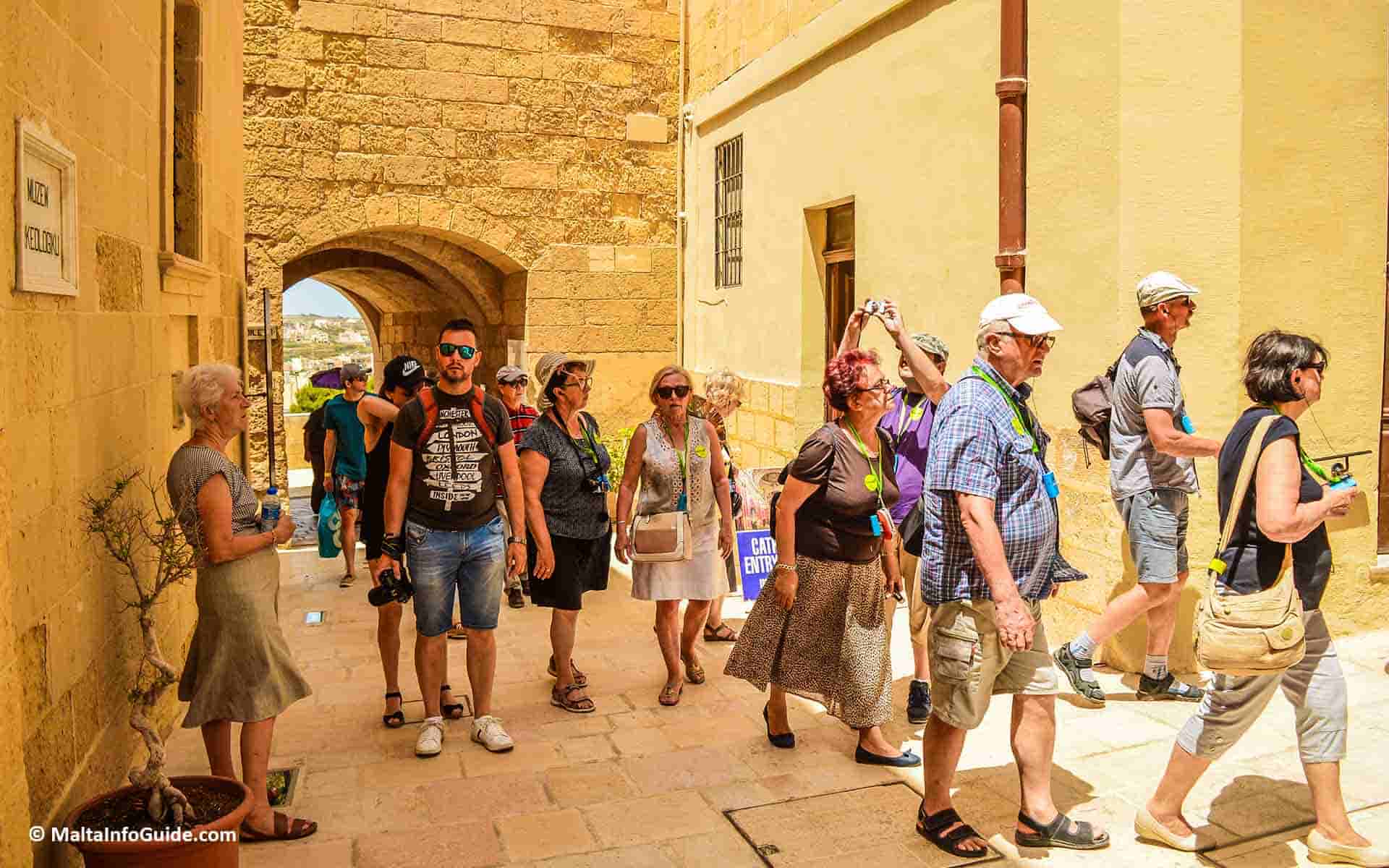 Citadel Gozo Malta | Daily arrival of Tourists visiting Ic-Cittadella.
Citadel Gozo Malta | Daily arrival of Tourists visiting Ic-Cittadella.Cathedral Square
As soon as you enter the fortification door you are immediately in the main large square with imposing steps leading up to the cathedral dedicated to the Assumption of the Blessed Virgin Mary.
The silence inside is soothing except when people pass walking through the entrance arch. It is the first place where tourists meet within the citadel with the imposing cathedral in front of them. On the left imposing high-up is the present Law Courts. It was previously the Palace of the Governors of Gozo.
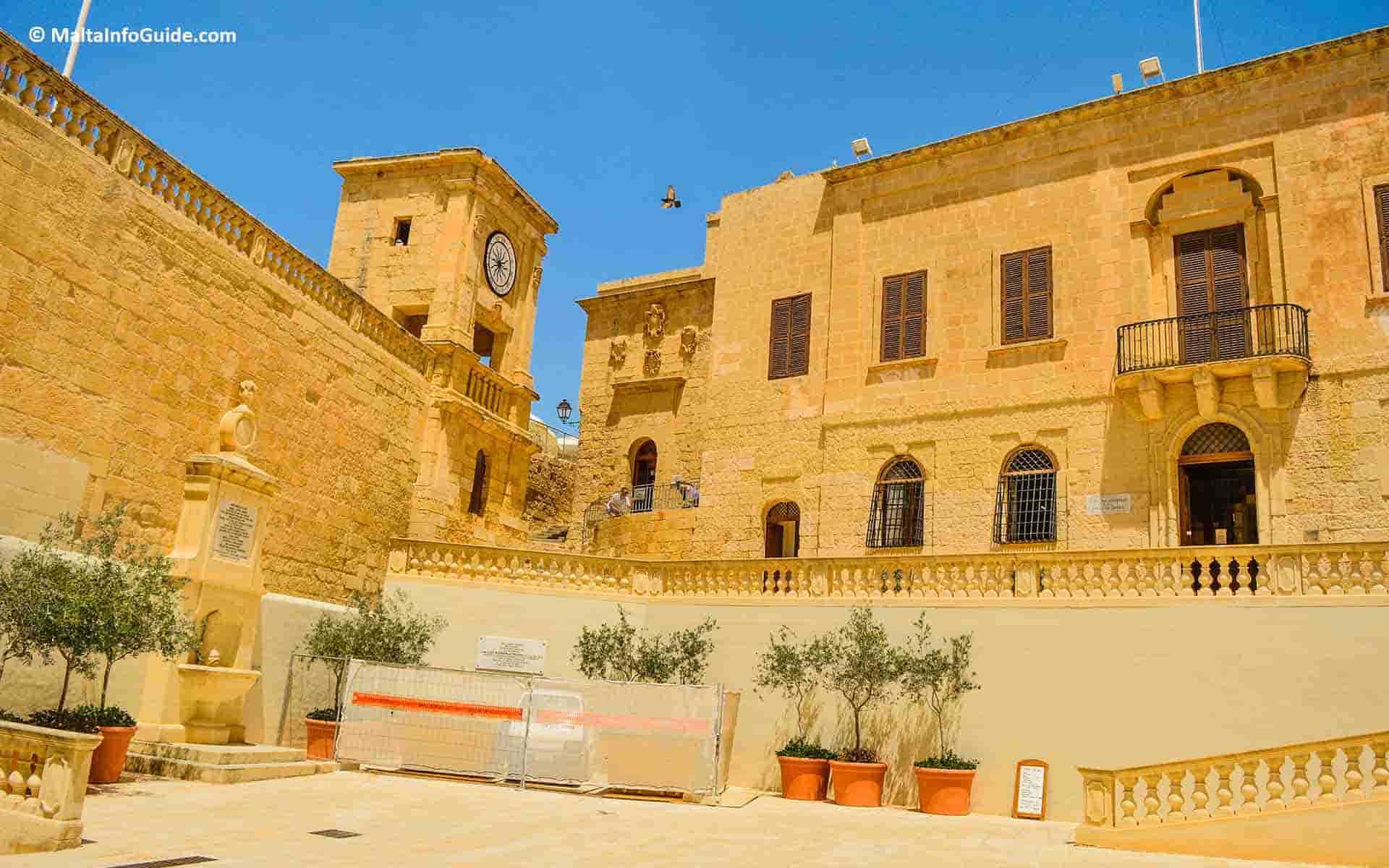 The Old Prison is seen to the left of the Law Courts, which were formerly the Governor's Palace, together with the Fortification Walls and the Clock Tower.
The Old Prison is seen to the left of the Law Courts, which were formerly the Governor's Palace, together with the Fortification Walls and the Clock Tower.A passage along the palace lets you walk to the fortification walls and the narrow streets behind. On the right side opposite, the parish offices and the Chapter’s Hall built in 1899.
On the right side the smaller door way the real entrance door there is the museum and public toilets. Passing just sideways under an arch back into the square. The group of private houses where the square stands today were demolished in the 1860s.
Old Prison
Today, the old prison is open to the public which can be viewed through the tickets bought at the visitors centre.
The old prison is located behind the Law Courts at the main square upon arriving on the left side. It was originally connected with it. It was active between the 16th century to 1962. Today it is divided into two sections the entrance which was a cell and then six individual cells.
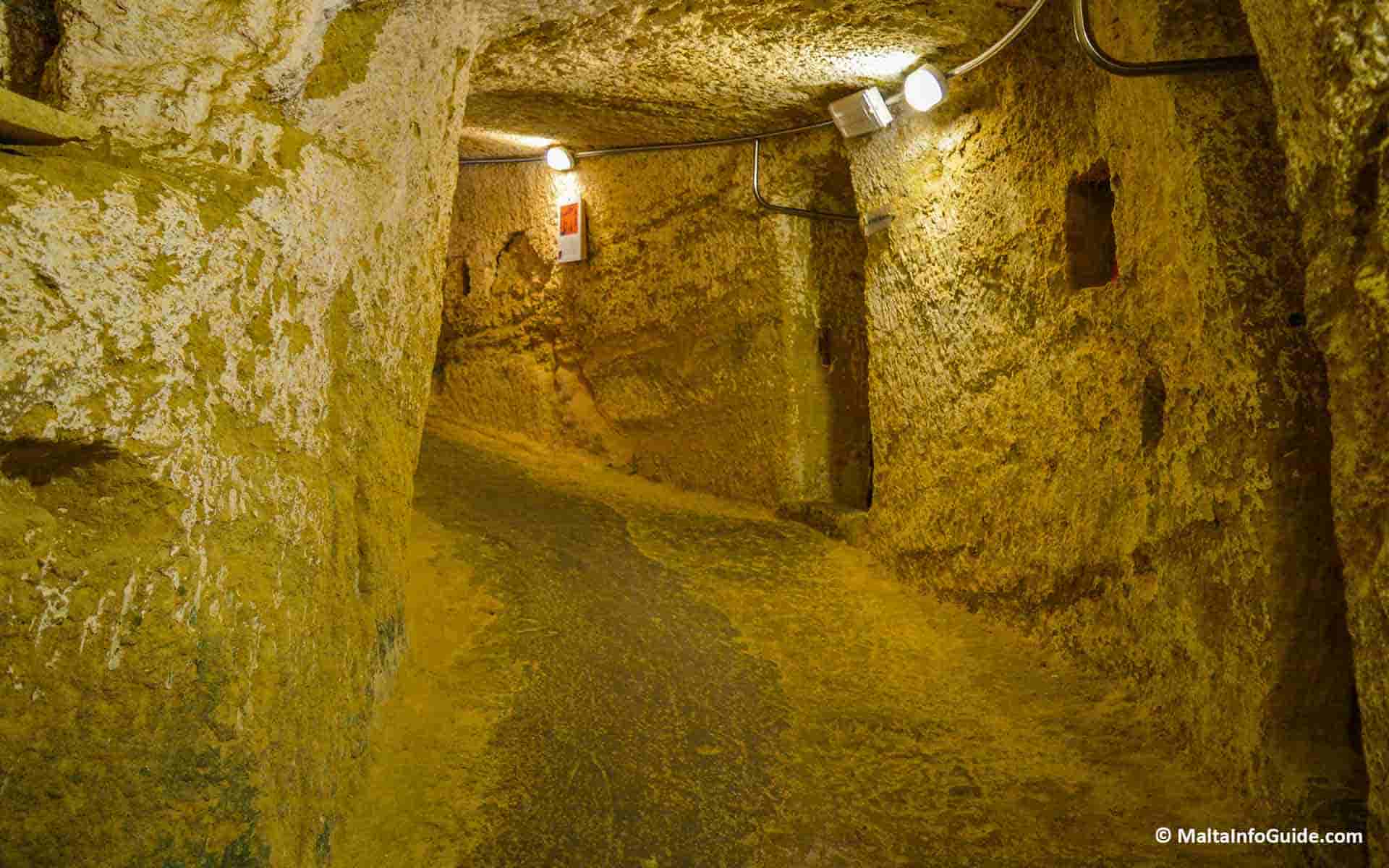 In the passageway leading to the Battery, there are five rather claustrophobic stone rooms.
In the passageway leading to the Battery, there are five rather claustrophobic stone rooms.It is curious to know that Fra Jean Parisot de Valette was imprisoned there where he later became the Grand Master of the Order of the Knights of St. John. It was initially used for the naughtiest persons and for uncontrollable knights who needed to calm down.
The prisons are very well preserved where you can still find a good number of graffiti etched within its walls by prisoners showing ships, names, crosses, dates and games.
The Citadel Clock
The Citadel clock stands in the echauguette on St. Michael’s bastion one of the fortified walls surround the Cittadella. It was originally a wall-mounted turret projecting from the walls used probably by guards.
In 1858 the clock was installed. Recently it was restored by the only remaining master in this field Giuseppe Muscat from Rabat Gozo.
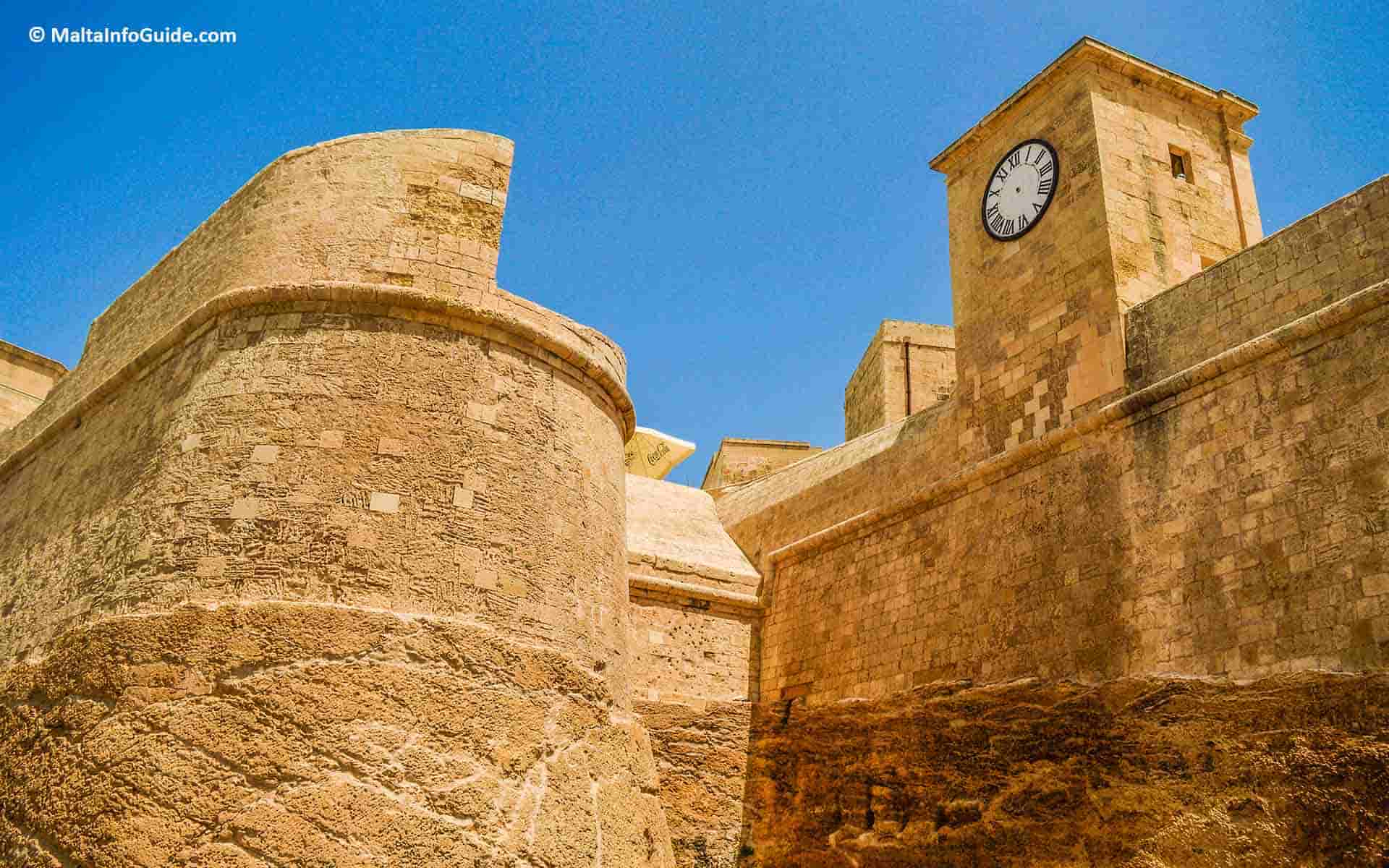 Gozo Island | The imposing fortification walls of the Citadel
Gozo Island | The imposing fortification walls of the CitadelThe Museum of Archaeology
It is located down an alley to the right side of the main square in one of last surviving palaces. It is the first museum opened in Gozo in 1960 dedicated to the history of this island. It contains remains from the Ggantija temple complex and the Xaghra stone circles, Neolithic to Medieval. A particular tomb-stone of a young Muslim girl named Majmuna
The Natural History Museum
Opened in 1991 spread in a cluster of 16th century houses in the older part of the city. One of the houses was an inn dated to 1495 and the other to the 17th century. The collection relates to the island’s geology with miners, insects, local environments including the human and various animal development.
World War II Air Raid Shelters
Going up towards the entrance arch, on the left underneath St. Martin’s Bastion, a complex of 32 war-time shelters stretching 150 metres. Built during 1941 when the aerial attacks reached the Maltese islands from Sicily by the Italian and German air forces.
In 2018 they were restored for the public to view how people used to live during World War II.
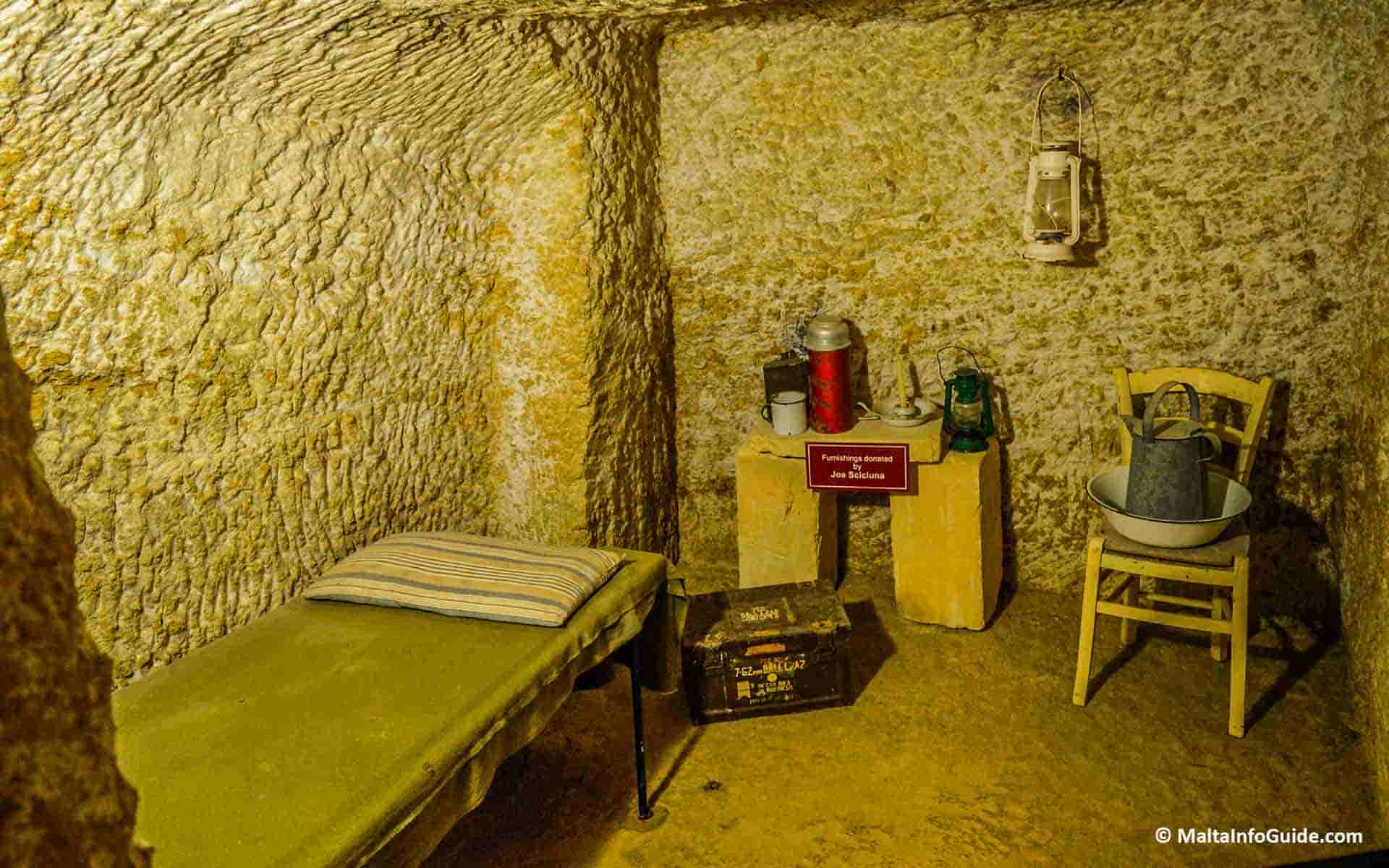 Typical World War II air raid shelter equipped with the few items a family needed for their stay.
Typical World War II air raid shelter equipped with the few items a family needed for their stay.The fortifications
The fortification walls stand high-up on this promontory, visible from almost all the island. Built of limestone golden-coloured have acquired a qoxra by time. Today they have been restored through a massive revamp of the entire surrounding walls and reinforcing them to protect them from decay.
They were designed by Francesco Laparelli the papal engineer and architect of Valletta the capital city of Malta. He was one time assistant to Michelangelo, his knowledge the island gained so much. They were designed in 1567 but were actually built 32 years later and had never had any test of actual war.
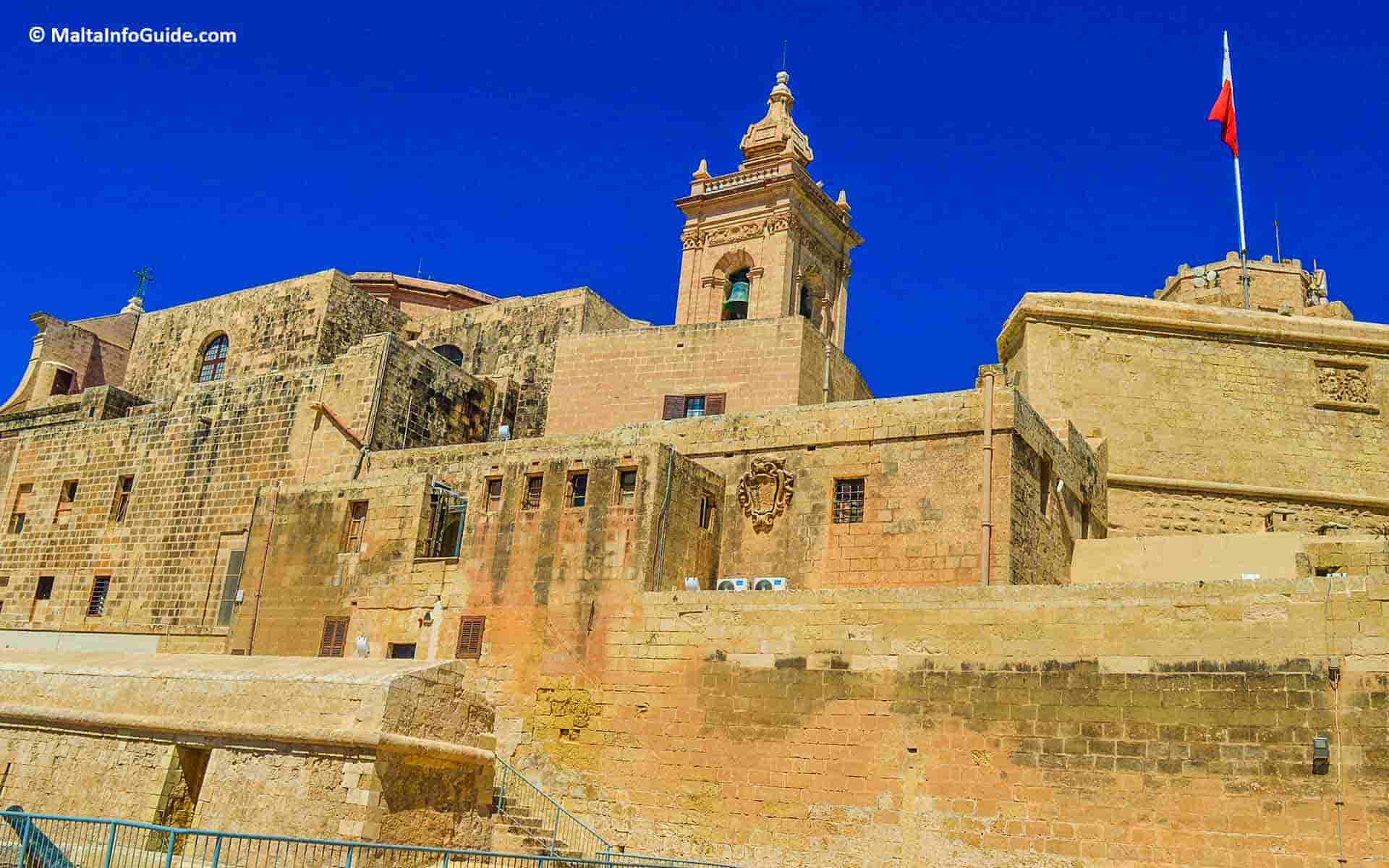 Captivating View of Gozo's Citadel Showcasing its Grandeur Across the Centuries
Captivating View of Gozo's Citadel Showcasing its Grandeur Across the CenturiesThey were funded principally by King Philip II of Spain. The local people through taxes on wine, oil, agricultural products and donations completed the rest of the funds that were required. The Knights of St. John were renounced for their ability of building the best as possible with regards to the imposing fortifications all through the islands.
By the time they were completed the Ottoman Turks were driven out of western Mediterranean Sea. Slowly the important of the population having to take refuge during the night through many years ended in 1637. Through this the population started spreading and settling in other parts of the island.
Most visitor takes the opportunity to walk around the fortification walls at the parapet wall with great panoramas of valleys, hills, road and villages weaving into each other. A distant sight of Malta.
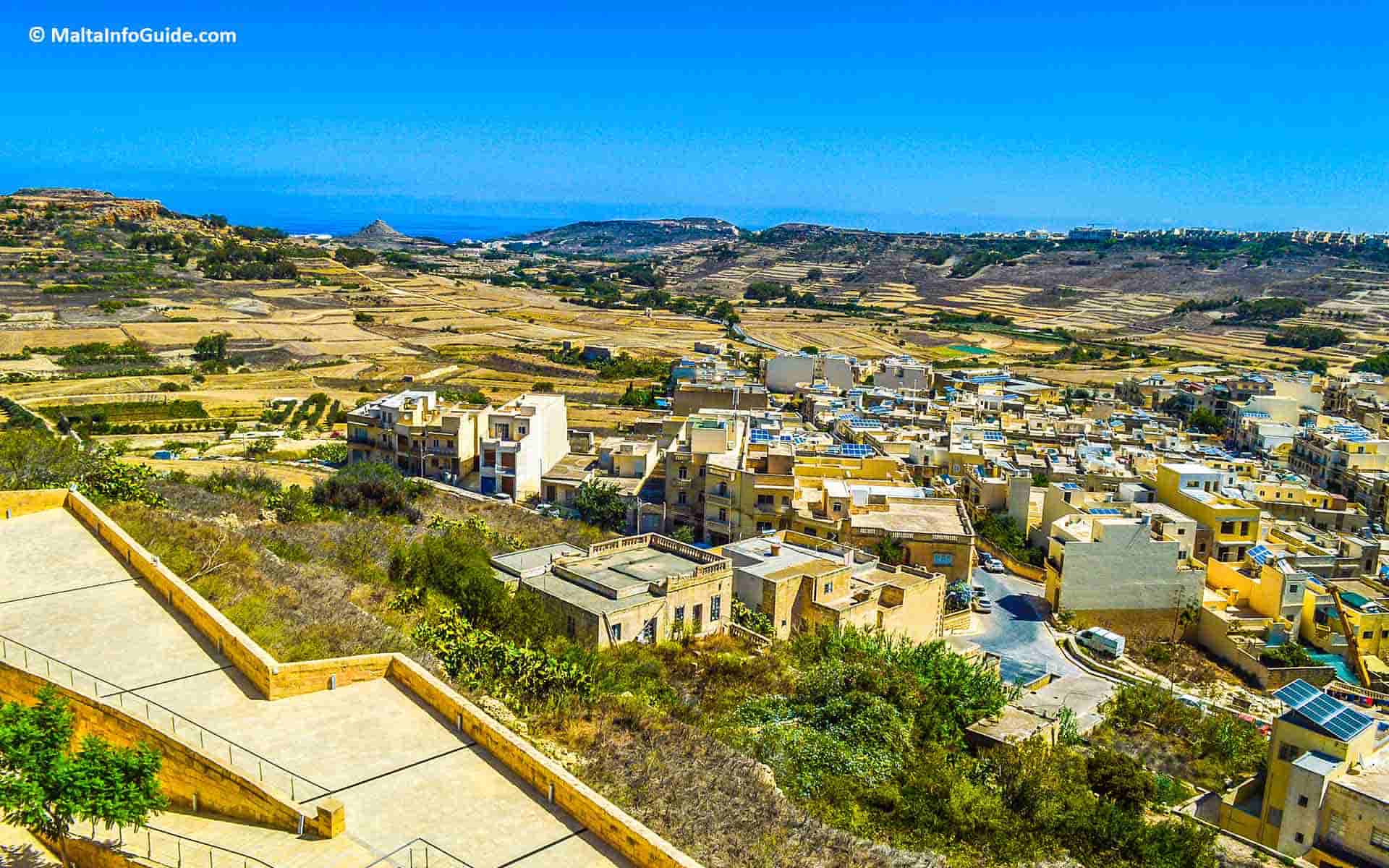 Citadel Gozo Malta | A view over Ic-Cittadella Fortifications
Citadel Gozo Malta | A view over Ic-Cittadella FortificationsWhere to eat at the citadel
Ta’ Rikardu Restaurant
A very popular restaurant visited by locals and tourists with typical food great service and reasonable prices. It serves traditional tasty food as very typical Maltese platters with olives, capers, sun dried tomatoes, olive oil, local cheese lets and local fresh bread. They are all reasonably prices
Other plates which are locally popular, rabbit in stew, fish soup, ravjoli, pasta with rabbit sauce. Homemade wine by the owner Rikardu is also served.
Cafe San Martino
Located on the fortification ramparts offering a great view while you rest. It can be easily reached through the side narrow roads beside the lawcourt or walking along the ramparts of the bastion walls. It offers Gozo cheese platters, Maltese tasty ftira, a variety of salads including other selections all flavoured with Gozitan ingredients.
Other Places You Can Visit
Apart from visiting the Citadel, there is much more you can visit on your trip to Gozo. The former Azure Window in Dwejra is still a highly visited attraction together with Fungus Rock, Dwejra Bay and Dwejra Tower.
If you love hidden gems, then there is a cave that has become very popular across the island. Tal-Mixta Cave is a cave located on top of Ramla L-Hamra.
After visiting Ic-Cittadella you can walk back down the steep road to Victoria, to the Independence Square which will take you around 10 minutes. Here you can also opt to find other restaurants around the square to take a deserved rest. You can proceed walking around and looking at the shops selling souvenirs.
Want To Share This Page On Pinterest? Pin It Here!
Thinking About Renting A Car For Your Holiday?
Renting a car for your holiday gives you so much freedom to explore the islands at your own pace without any possible restrictions. We personally tried Discover Cars and loved their great service and affordable prices.
Get The Best Rates On Your Car Rental Now!
Need to book a hotel for your Malta visit?
Looking for the perfect place to stay? Booking.com is always our go-to website as we know that we will find the right accommodation for the best prices possible. This super-easy platform cannot be recommended enough!
Find Your Hotel Now Using Booking.com!
 By Albert and Benjamin Magro
By Albert and Benjamin Magro